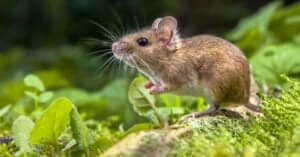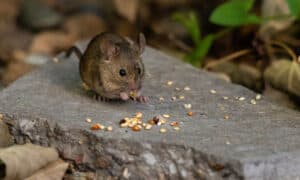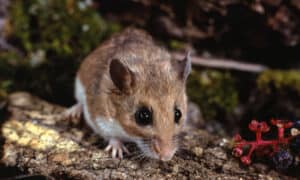Key Points
- Guinea pigs take short naps during the day and at night.
- Cardboard boxes provide excellent sleeping quarters which can easily be replaced once the occupant has chewed them up.
- They are especially active early in the morning and early in the evening.
Lots of animals are nocturnal, or active at night. Raccoons, owls, bats, and foxes are just a few examples of nocturnal wild animals. Many types of pets are also nocturnal. Domesticated cats run, play, and explore at night. Pet mice and hamsters are actively digging in their shavings and running on their exercise wheels at night. But, how about guinea pigs? Are guinea pigs nocturnal?
Continue reading to find the answer and discover how long these cute little animals sleep, why two or more sleep in a huddle, and where these creatures are likely to catch some Zs.
Are Guinea Pigs Nocturnal?
The answer to the above question is yes and no. A guinea pig’s behavior is part nocturnal and part diurnal. They sleep for short periods at night as well as during the day. This is typical of many small mammals. Take a second to think about it. A small wild mammal that goes into a long, deep sleep at night or during the day, is vulnerable to predators. But, sleeping for short periods throughout the day and night means they can get the rest they need without putting themselves at risk.
Just because a guinea pig is kept as a pet in a home doesn’t mean it’s going to drop the habits of its wild guinea pig relatives. So, the owner of a guinea pig shouldn’t be surprised if this pet is up at night digging, eating, and playing with the toys in its cage.
Where Do Guinea Pigs Sleep?
Wild guinea pigs sleep in burrows. So, guinea pig owners should keep that in mind when planning a sleeping area for their pet. Most guinea pig cages won’t accommodate enough shavings for a guinea pig to make a deep burrow. So, it’s best to set up a place where this pet can hide and rest.
A small cardboard box is something a guinea pig can chew on as well as a retreat when it’s time to nap. This is an inexpensive option, and a pet owner can replace it easily when the guinea pig has chewed it to bits. An old shoebox or tissue box that’s been cut in half makes a relaxing shelter for a pet guinea pig.
Fabric pouches made of fleece are available at most pet stores. These pouches are soft, colorful, and large enough to accommodate a sleeping guinea pig. One of the best things about a sleeping pouch is it can be washed when necessary. Some pet stores have small tunnels or huts made out of twigs or straw. A guinea pig can crawl into this type of structure to sleep. Plus, these structures are made out of non-toxic material so a guinea pig can safely chew on them.
Of course, a guinea pig may simply dig a shallow hole in its shavings as a place it can settle down to sleep. Every guinea pig has its sleeping preferences.
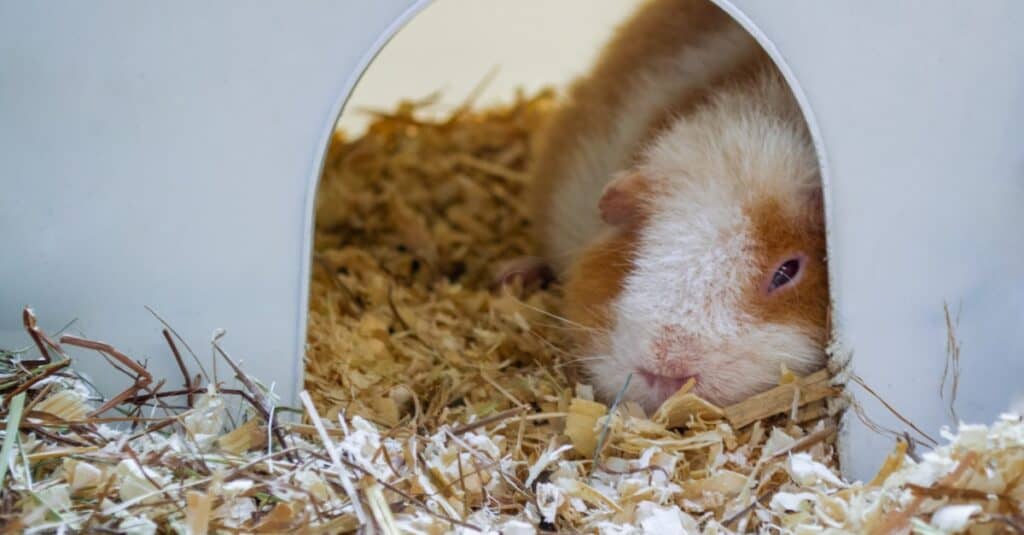
©iStock.com/Goroda
How Do You Know When a Guinea Pig is Sleepy?
Guinea pigs are very expressive animals. They squeal, whistle, chatter, purr, and chirp. These small pets make these noises for a variety of reasons. Sometimes when a guinea pig is sleepy, it makes a low chirping sound.
A sleepy guinea pig may turn around and around in one corner of its cage to create a comfortable place to rest. It may even kick or move the shavings to make its bed just right. When a guinea pig yawns it shows off its long teeth. Sometimes yawning is just a way to stretch the muscles in its jaw. Other times, yawning is an indication of tiredness in guinea pigs just as it is in humans.
When Are Guinea Pigs the Most Active?
Guinea pigs are most active early in the morning and early in the evening. Not surprisingly, this is when most wild guinea pigs are active as well. Why? Because daylight is just coming up at dawn and fading at dusk. This means a wild guinea pig is more difficult for its predators to see. A wild guinea pig has so many predators, it has to do whatever it can to avoid being eaten.
Alternatively, a pet guinea pig doesn’t have to contend with wild predators. So, it may sleep more than its wild relatives. Even if a guinea pig is taking a quick nap during the day, it’s likely to wake up for any opportunity to play a game with its owner.
As an owner gets to know their guinea pig, they become familiar with the animal’s sleeping habits. So, if a pet guinea pig is usually sleeping around three o’clock in the afternoon, the owner knows to leave it alone for a while so it can get the proper amount of rest.
How Long Do Guinea Pigs Sleep?
Of course, there’s no solid rule for how long guinea pigs sleep. Generally, they sleep for periods of ten to 30 minutes at a time. This is just long enough to restore their energy so they can continue pushing around shavings in their cage or playing with other guinea pigs in their habitat.
Like many small animals, a guinea pig goes through a cycle of being asleep and awake. Specifically, this animal may take six or seven naps over 24 hours. An owner who tries to keep track of when their guinea pig sleeps is going to be able to tell whether their pet is getting enough sleep to stay healthy.
Someone who keeps two guinea pigs in a cage is likely to see them sleeping on the same schedule. This is so one won’t disturb the other when it is trying to rest. Two or more guinea pigs are probably going to cuddle together to sleep. Guinea pigs in the wild do this to stay warm and as a way to keep safe from predators. If a predator enters the area, one of the wild guinea pigs in the group can alert the others.
What Type of Shavings Does a Guinea Pig Need?
Some guinea pigs choose to sleep on the floor of their cage. But, even if a guinea pig sleeps in a box, it’s important to have the right kind of shavings in the habitat.
Non-toxic wood shavings are suitable to cover the floor of a guinea pig’s cage. These shavings are excellent at absorbing urine and feces. When it’s time to clean the cage, the used shavings can be dumped into the garbage. After the cage is washed, new shavings can be put down on the floor.
Aspen wood shavings are another favorite type of bedding for this pet. These shavings are dust-free, so they don’t aggravate respiratory issues or stir up any allergies in this little mammal.
Sawdust shavings are not recommended for guinea pigs or other small pets because of the amount of dust they contain. Imagine all of the kicking and digging most guinea pigs do throughout the day and night! Quality, non-toxic shavings won’t cause a dust cloud when an owner goes to dump them out at cage cleaning time.
A pet owner may see shavings available advertising a scent that hides any odor in a guinea pig’s cage. However, it’s best to avoid shavings with a strong scent. A guinea pig’s respiratory system may be aggravated by a strong, artificial scent contained in its shavings. If an owner changes the bedding once or twice a week, the cage won’t be likely to take on an odor.
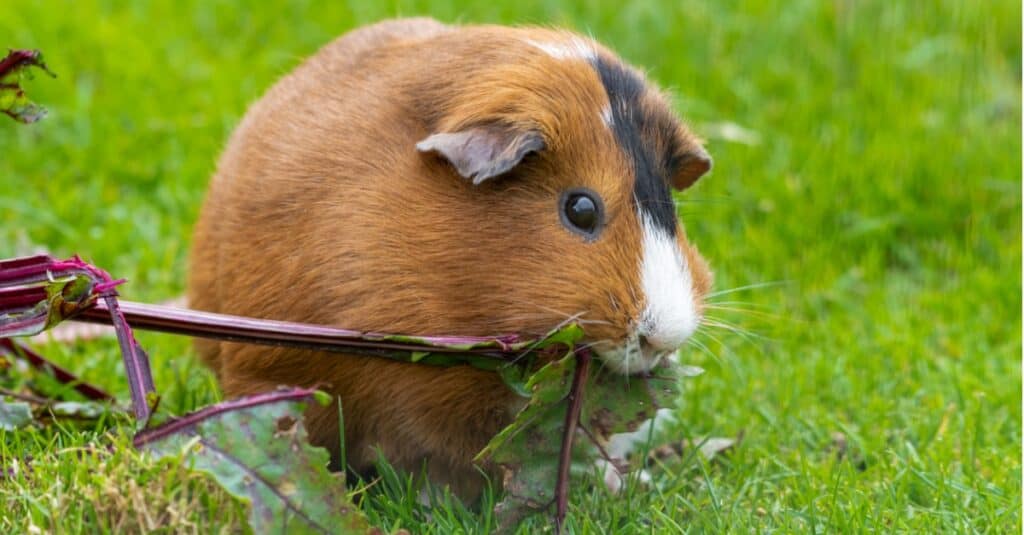
©iStock.com/Ian Fox
How to Determine If a Guinea Pig is Getting Enough Sleep?
Sleep is just as important to guinea pigs as it is to us humans. Getting enough sleep contributes to a guinea pig’s health. But, how do you know if a guinea pig is getting enough sleep?
A good appetite is one way to know a guinea pig is getting the rest it needs. Along with its regular food, a guinea pig can eat vegetables such as celery, carrots, and zucchini. When a guinea pig stops eating, it’s time to take it to the veterinarian for treatment.
Regular activity is another sign that a guinea pig is getting enough sleep. Healthy guinea pigs love to run around, jump, and play games. Of course, an older guinea pig is not going to be as active as a young one. A lethargic guinea pig should be checked out by a veterinarian.
A guinea pig that makes a lot of noises is a well-rested pet. These animals have several vocalizations with various meanings behind them. They communicate with each other as well as with the people who take care of them. A very quiet guinea pig may not be getting enough rest.
Up Next…
Keep reading these posts for more incredible information about key animal facts.
- 10 Incredible Guinea Pig Facts: They’ve got particularly sensitive noses, have their very own language, and love to boss other fellow cavies around. Find out more about this adorable rodent which is a source of amazing surprises.
- Guinea Pig Types: The Ultimate Guide to Guinea Pig Breeds: Some have long silky coats, others are covered in curly fur. Some are gentler and easier going compared to others. Find out what breeds they belong to and what others exist in this comprehensive guide on guinea pigs.
- Guinea Pigs as Pets: How to Care for Your Pet Guinea Pig: Affectionate and adorable, these rodents are easy to care for. Find out what they will need and the main types available.
The photo featured at the top of this post is © iStock.com/VikaRayu
Thank you for reading! Have some feedback for us? Contact the AZ Animals editorial team.




